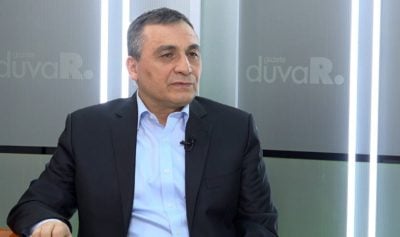Is Turkey’s Alliance with Russia in Jeopardy?
“The relations between Turkey and the United States is not easily repaired,” Interview with Aydin Sezer

All Global Research articles can be read in 51 languages by activating the Translate Website button below the author’s name.
To receive Global Research’s Daily Newsletter (selected articles), click here.
Click the share button above to email/forward this article to your friends and colleagues. Follow us on Instagram and Twitter and subscribe to our Telegram Channel. Feel free to repost and share widely Global Research articles.
***
Turkey’s foreign policy has changed 180° recently. Turkish President Recep Tayyip Erdogan has accepted Sweden joining NATO even though Sweden allowed the burning of the Quran. President Erdogan has also shifted his Alliances from Moscow to Washington.
Steven Sahiounie of MidEastDiscource interviewed Aydin Sezer, political scientist, foreign policy analyst, former diplomat, and economic advisor at the Turkish Embassies in Cairo and Moscow to get the backstory of all the new developments of Turkey and turkies foreign policy.
Steven Sahiounie (SS): President Erdogan has apparently turned his back on his Alliance with Russia and has turned back towards the West. Recently we heard a Russian official say that Turkey is no longer considered a friend and an ally. In your opinion will this new tension between Erdogan and Putin affect the Ukraine grain deal?
Aydin Sezer (AS): I believe there is no link between the recent political developments and the Turkey-Russia-Ukraine grain deal. Because Russia has stated for months that it will not extend the grain agreement.
Turkey’s NATO relations and Sweden’s membership in NATO do not necessarily imply that Turkey is moving westward. Turkey, as a NATO member, would have taken this step regardless. Russia is more concerned with Sweden and Finland’s NATO membership than with Turkey’s behavior. Let us not forget that Russia’s relations with NATO member Turkey are far more important.
It is the only source of contention in Turkish-Russian relations. Extradition of AZOV militants to Ukraine by Turkey. However, this problem is unlikely to cause any harm.
SS: Turkey and Russia had an agreement from 2019 to open the M4 highway from Latakia to Aleppo however, Turkey never delivered on its promise. In your view why did Turkey make agreements with Russia concerning Idlib that Turkey never intended fulfilled?
AS: Yes, the Idlib accords have not been met. This is correct, but cooperation in the other parts of Syria (Afrin, southeast) has kept Turkey and Russia together in Syria. Not to mention that the bilateral relations between Turkey and Russia allowed the Idlib problem to be moved to the second or even third plan.
The main issue in Idlib is that Turkey has not only failed to carry out the task assigned to it in Astana, namely distinguishing between moderate armed opposition and terrorists, but has also been accused by Assad of supporting terrorists.
SS: Erdogan has instituted new economic measures such as increasing taxes and media reports that the Turkish people are very unhappy with increase prices and taxes. In your opinion will Erdogan lose supports so soon after an election?
AS: I don’t think Erdogan will lose support because he won the elections despite the country’s long-running economic crisis. Erdogan has a long five-year term ahead of him, even if the new economic policies spark public outrage.
SS: President Erdogan had made very serious statements after the burning of the Quran in Sweden and yet we see he has now reversed his position and has allowed Sweden to join NATO. In your opinion did America promise President Erdogan with EU membership if he would accept Sweden part of NATO?
AS: First and foremost, I must state that Turkey’s NATO membership cannot be linked to its European Union membership. This is a statement made by Erdogan for the Turkish citizen on the street, and it is technically impossible for Biden to make such a promise. It is unthinkable for the United States to put pressure on the EU on this issue. The United States can only express its intentions.
SS: Turkey appers to be focused on repairing a very broken relationship with America. In your opinion how will Turkey be able to reconcile these differences with America while America continues to support and defend the SDF and YPG who are directly tied with the PKK a terrorist organization that hase killed 30 thousand Turks in last 3 decade?
AS: Relations between Turkey and the United States are not easily repaired today. These are more serious structural issues. Turkey is still in the process of establishing contact with the United States. Only on the margins of international summits can Erdogan and Biden meet.
Unfortunately, Turkey has come to accept the United States’ support for terrorism in Syria. Relations are unlikely to improve in the near future, in my opinion. Another major issue for the US is Turkey’s Russia policy. Let us not forget that Turkey is still subject to US sanctions. It has been kicked out of the F-35 program and sanctioned by Caatsa.
*
Note to readers: Please click the share button above. Follow us on Instagram and Twitter and subscribe to our Telegram Channel. Feel free to repost and share widely Global Research articles.
This article was originally published on Mideast Discourse.
Steven Sahiounie is a two-time award-winning journalist. He is a regular contributor to Global Research.
Featured image is from MD

